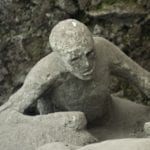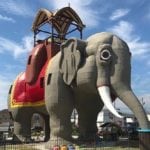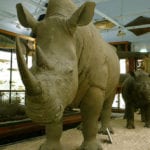 Crime
Crime  Crime
Crime  Technology
Technology 10 Hilariously Over-Engineered Solutions to Simple Problems
 Miscellaneous
Miscellaneous 10 Ironic News Stories Straight out of an Alanis Morissette Song
 Politics
Politics 10 Lesser-Known Far-Right Groups of the 21st Century
 History
History Ten Revealing Facts about Daily Domestic Life in the Old West
 Weird Stuff
Weird Stuff 10 Everyday Products Surprisingly Made by Inmates
 Movies and TV
Movies and TV 10 Actors Dragged out of Retirement for One Key Role
 Creepy
Creepy 10 Lesser-Known Shapeshifter Legends from Around the World
 Animals
Animals 10 Amazing Animal Tales from the Ancient World
 Gaming
Gaming 10 Game Characters Everyone Hated Playing
 Crime
Crime 10 Terrifying Serial Killers from Centuries Ago
 Technology
Technology 10 Hilariously Over-Engineered Solutions to Simple Problems
 Miscellaneous
Miscellaneous 10 Ironic News Stories Straight out of an Alanis Morissette Song
Who's Behind Listverse?

Jamie Frater
Head Editor
Jamie founded Listverse due to an insatiable desire to share fascinating, obscure, and bizarre facts. He has been a guest speaker on numerous national radio and television stations and is a five time published author.
More About Us Politics
Politics 10 Lesser-Known Far-Right Groups of the 21st Century
 History
History Ten Revealing Facts about Daily Domestic Life in the Old West
 Weird Stuff
Weird Stuff 10 Everyday Products Surprisingly Made by Inmates
 Movies and TV
Movies and TV 10 Actors Dragged out of Retirement for One Key Role
 Creepy
Creepy 10 Lesser-Known Shapeshifter Legends from Around the World
 Animals
Animals 10 Amazing Animal Tales from the Ancient World
 Gaming
Gaming 10 Game Characters Everyone Hated Playing
10 Macabre Tourist Attractions
When we plan our vacation activities, many of us think of lazing on the beach with a good book or hiking through crisp mountain air. Maybe we plan on taking in the cultural treasures in museums or art galleries, visiting famous buildings or natural landmarks, or even taking in some adrenaline-filled outdoor activity.
SEE ALSO: 10 More Macabre Folktales From Around The World
However, there are a number of macabre tourist attractions throughout the world that many of us would have nightmares about visiting. In fact, it’s hard to imagine how some of these attractions were ever established, let alone enjoy ongoing popularity. Displays of murder scenes, rat-infested temples, and voodoo markets are just some of the bizarre tourist attractions that some travelers have on their itinerary.
10 Sedlec Ossuary
Czech Republic
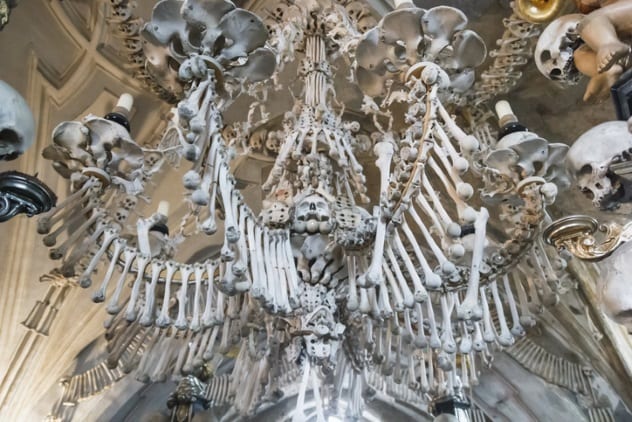
The Sedlec Ossuary in the Czech Republic is an unremarkable medieval Gothic church from the outside. Step inside, however, and you will find that this is no ordinary chapel. While many churches are adorned with gilt and marble, the “Bone Church” is decorated with human remains.
In 1870, the ossuary under the church had become overcrowded with a couple of centuries’ worth of skeletons. A local woodcarver was called in to put the bones into some sort of order. His idea was perhaps not what the officials originally had in mind.
More than 40,000 skeletons decorate the church, adorning archways and fashioned into a coat of arms. A large chandelier is crafted from every bone in the human body, and strings of bones festoon the nave. Every part of the church is decorated with the bones from the old ossuary.[1]
The results seem a little macabre, but the skeletal artworks now draw thousands of tourists each year.
9 Capuchin Catacombs
Sicily
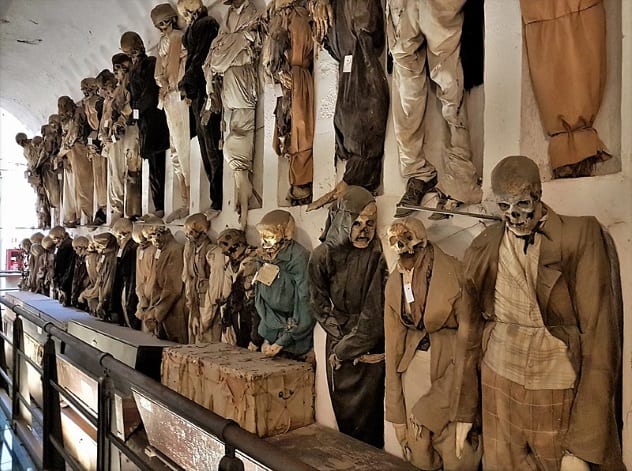
On the outskirts of Palermo in Sicily, over 8,000 bodies are on display in the Capuchin Catacombs. A visit to the ghoulish tourist attraction would be the stuff that nightmares are made from and not for the faint of heart.
The catacombs date back to the 16th century, when Capuchin monks needed more space for their cemetery, so they excavated a crypt beneath their church. Bodies were transferred from the cemetery to the new crypt, where they rest in various states of mummification.
Although the catacombs were originally set aside as a final resting place for the monks, wealthier citizens began to pay to be embalmed within them. Bodies were dressed in their Sunday best and displayed along walls and in caskets. Some better-preserved corpses still have hair and teeth intact, with identifiable facial expressions.
One of the most chilling displays is a young child, Rosalia Lombardo, who died in 1920 and was one of the last people to be embalmed within the catacombs. She has been dubbed “The Sleeping Beauty” because of her remarkable state of preservation. Local authorities banned embalming in 1920.[2]
8 Temple Of The Rats
India
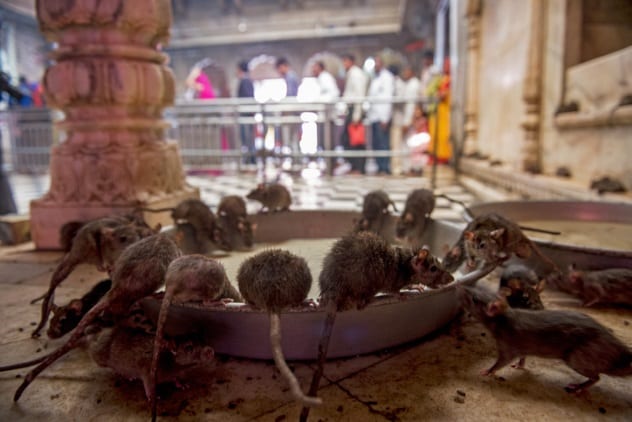
A Hindu temple in Deshnoke, Rajasthan, is infested with rats, but tourists flock to see it.
Over 20,000 rats live in the temple.[3] They are considered sacred beings by the Charan people. Worshipers feed the rats each day, and protective wires have even been put in place to keep them safe from predators. While the rodent population is predominantly black, spotting the occasional white rat is considered to be a blessing.
Visitors to the temple are required to take off their shoes before entering. Walking barefoot through rat droppings certainly doesn’t sound like a fun thing to do. Nor is having rats scurry across your feet, which is considered good luck.
7 Lake Natron
Tanzania
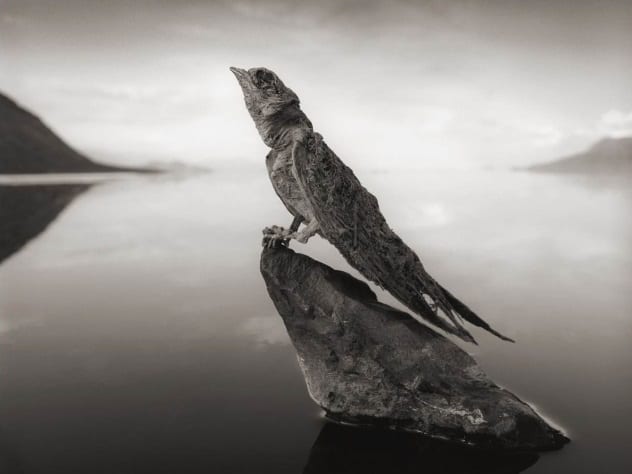
An African lake is surrounded with the corpses of calcified animals. High levels of sodium bicarbonate in Tanzania’s Lake Natron mummify any creatures that die on the lake, turning them into bizarre statues. Macabre mummified animals can be found around the lake.
Lake Natron has a particularly inhospitable environment. The high alkalinity of the lake can cause caustic burns to animals not used to the water, and temperatures can reach as high as 60 degrees Celsius (140 °F). However, the waters are home to flamingos and other bird species, which breed in the lake’s shallows. The birds feed on the algal blooms caused by the lake’s high salinity.[4]
6 Island Of The Dolls
Mexico
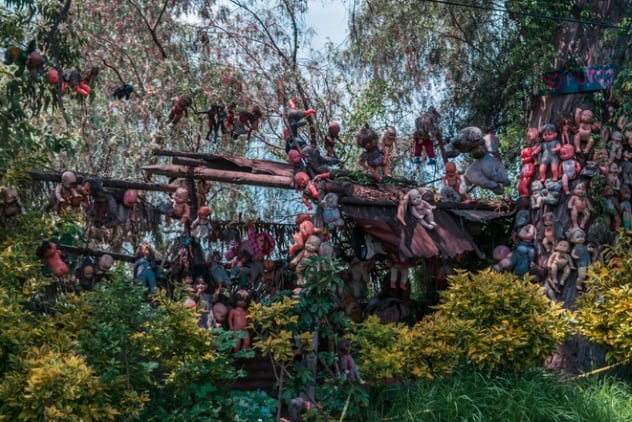
When Don Julian Santana took up a reclusive existence on a small island in the canals of Xochimico, Mexico City, he became obsessed with the thought that a young girl had drowned in the canals. He spent his life collecting old dolls, which he hung from trees around the island to appease the soul of the girl.
Isla de Munecas has become a macabre tourist attraction, with visitors adding to the thousands of decaying dolls strung from trees, some limbless and others headless or staring blankly into space like something from a bizarre horror movie. The more gullible believe the dolls are, in fact, possessed by the souls of dead children and can be heard muttering among themselves.
5 Phnom Sampeau Killing Caves
Cambodia
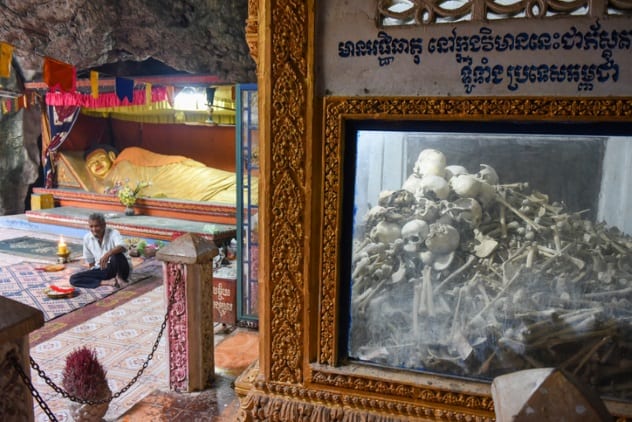
Deep in the jungle near Battambang, Cambodia, lie the Killing Caves of the Khmer Rouge genocide. Victims were marched to holes at the tops of the caves and were bludgeoned to death, their bodies falling into the caverns below. Men and women were killed at separate caves.[6] While many tourists visit the jungle area for the temples, scenery, monkeys, and bat colonies, others are attracted by a somewhat macabre tourist attraction.
Today, tourists trek to the the Killing Caves, which have been preserved as a memorial to those who were murdered and dumped into the darkness below. Within the caves, bones of unidentified victims are encased in glass displays. Other random collections of bones sit in chicken wire crates as a chilling reminder of the cave’s morbid history.
It would certainly be a chilling and unpleasant site to visit.
4 Paris Catacombs
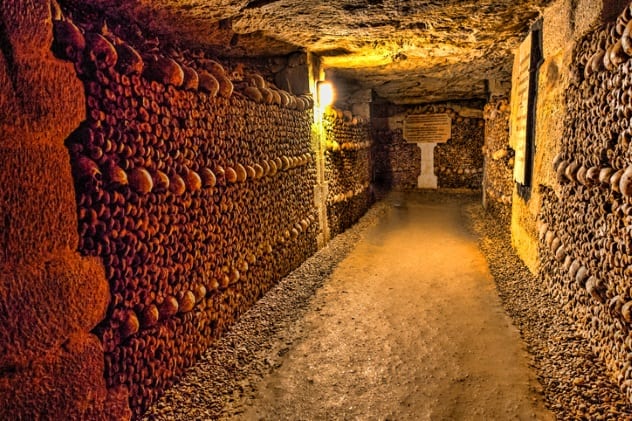
During the late 18th century, the cemeteries of Paris were overflowing, and officials needed to find a receptacle for the dearly departed. Citizens began complaining of odor and disease from the decomposing bodies in the overcrowded cemeteries.
The solution was found in the network of quarries beneath the city.[7] Bodies were transferred from cemeteries overnight and dumped down in the old mines. The ossuary became a haphazard mound of assorted skeletal remains.
From 1810, the mountains of bones were organized and stacked along the walls in decorative patterns to form the mausoleum which is visited today. Unidentified skulls are stacked on top of neatly placed femurs. There is no class structure among the row after row of skeletons, with the wealthy mixed in with the poor.
Over six million deceased Parisians are entombed in the catacombs beneath the city, which has been a popular tourist attraction since the late 19th century. Only a small fraction of the roughly 320 kilometers (200 mi) of tunnels are open to the public today.
3 Siriraj Medical Museum
Thailand
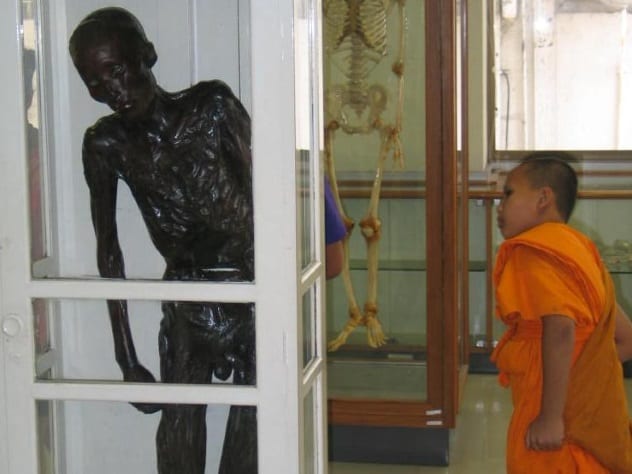
A Bangkok museum houses a morbid display of all things related to illness, death, and deformity.
The “Museum of Death,” or Siriraj Medical Museum, is located in Thailand’s oldest hospital, displaying an array of ghoulish exhibits. The museum was originally established as an educational resource for medical professionals and students. It has, however, become a somewhat gruesome tourist attraction.[8]
Exhibits on display include deformed babies preserved in formaldehyde, bodies of accident victims, and dissected body parts. The museum even houses the mummified body of a notorious serial killer, presumably displayed to deter others from repeating his crimes. Other exhibits graphically show the effects of tumors on various body parts as well as genetic deformities. Murder weapons and gruesome displays of strange deaths are included in the collection.
Unless you are a serious pathology or forensic researcher, this museum seems to be somewhat macabre.
2 Akodessawa Fetish Market
Togo
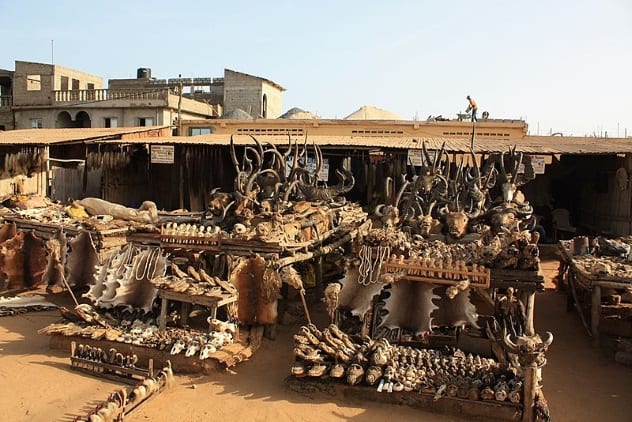
This bizarre market in Lome, Togo, has everything you need to cast a spell. Voodoo practitioners travel from all over West Africa to source monkey heads, reptile heads, and animal parts.[9] Described as an “alternative pharmacy,” a stroll through the Fetish Market would seem to produce, rather than cure, illness.
Animal parts in various stages of decay are lined up on tables in the outdoor market. You can just imagine the stench that would waft through the rows. The produce at the market ranges from huge animal bones to place at your back door to ward off evil spirits, to animal feet which can be made into talismans to ensure that your home team wins this weekend.
1 Museum Of Death
United States
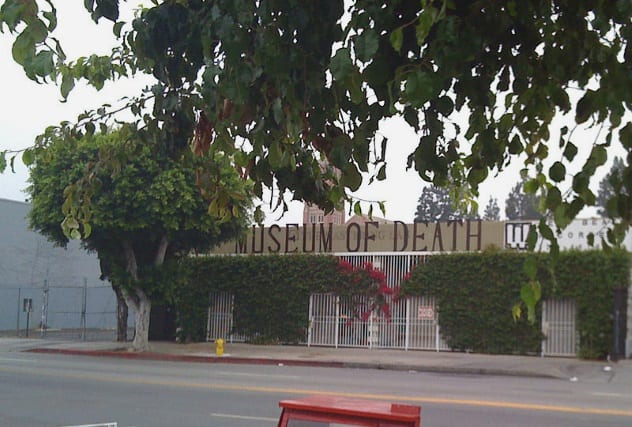
The Museum of Death houses a grisly collection of murder weapons, crime scene photos, and death-related memorabilia. The museum’s website claims it holds “the world’s largest collection of serial killer artwork, antique funeral ephemera, mortician and coroners instruments, Manson Family memorabilia, pet death taxidermy, crime scene photographs and so much more!”[10]
Exhibits include the guillotined head of “Blue Beard of Paris,” a collection of body bags and coffins, execution devices, and autopsy instruments. These aren’t the sort of exhibits that would appeal to most people, but the success of the museum indicates there are many out there who are not creeped out by ghoulish displays. The museum initially started in San Diego before moving to its current Hollywood location in 1995. There is also a second location in New Orleans.
Lesley Connor is a retired Australian newspaper editor who provides articles for online publications and her travel blog.
Read about more macabre, creepy vacation destinations on 10 Popular Tourist Attractions Filled With Human Remains and 10 Gruesome Murder Sites That Attract Tourists Like Flies.
